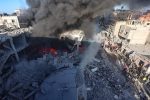The assassination of Hamas top leader Ismail Haniyeh on Wednesday will most likely be the boost Israeli Prime Minister Benjamin Netanyahu has been desperately looking for in this 10-month unprecedented genocidal war against the Palestinians.
Or this is how it might seem.
For Hamas affiliates, and many Palestinians would agree with them, martyrdom is not a loss. In the Islamic doctrine, martyrdom is one of two successful outcomes in the struggle for truth and justice; the other is victory.
When the Islamic Resistance Movement, Hamas, was born out of the womb of the Palestinian Muslim Brotherhood organization in December 1987, Haniyeh was a young cadre, who was about to turn 25.
Yet, like many of his Islamic comrades, he was born a leader. Since his birth on 23 December 1962 to a refugee family that fled its homeland in Palestine, close to the city of Ashkelon during the Nakba of 1948, he grew up and lived in Al-Shati refugee camp in the north of the Gaza Strip.
His primary and intermediate education was at Unrwa schools in Gaza. He obtained a second school certificate from Al-Azhar Institute and then joined the Islamic University in Gaza. It was during his time at the university, where he studied Arabic Literature, that he joined the Muslim Brotherhood.
His graduation from the university in the summer of 1987 was soon to be followed by the eruption of the Palestinian Intifada and the birth of Hamas. He was detained by the Israeli occupation forces for several brief periods in 1987 and 1988.
A year later, he was re-arrested and given a three-year prison sentence. Following his release, the Israelis detained him again in the winter of 1992 and deported him together with more than 400 senior Hamas leaders and activists to South Lebanon.
A unifying figure
From a young age, Haniyeh was a brilliant orator, an essential leadership characteristic in the Arab Islamic culture. He was known for his love of poetry. Yet, he started acquiring fame when, following the release of Sheikh Ahmad Yassin, a co-founder of Hamas, in the aftermath of the 1997 failed assassination attempt on the life of Hamas’ leader in Jordan, Khaled Meshaal, Haniyeh was appointed office manager and personal assistant to Sheikh Yassin.
Haniyeh’s peers and comrades would agree that he was a unifying figure. Within the Hamas circles, he was not seen as controversial but rather as a representative of a moderate, mainstream, middle ground trend within the movement.
This is what quickly ascended him to the top ranks of the movement when a succession of assassinations eliminated a whole generation of founders and leaders including: Imad Aqil on 24 November 1993; Yahya Ayyash on 5 January 1996; Jamal Salim and Jamal Mansur on 31 July 2001; Mahmud Abu Hannud on 23 November 2001; Salah Shehadah on 22 July 2002; Ibrahim al-Maqadma on 8 March 2003; Isma’il Abu Shanab on 21 August 2003; Sheikh Ahmad Yassin on 21 March 2004; Abd Al-Aziz al-Rantisi on 17 April 2004; and, more recently, Saleh al-Arouri on 2 January 2024.
When the Israelis attempted an assassination on the life of Sheikh Yassin for the first time on 6 September 2003, Haniyeh was with him and both men sustained light wounds. Sheikh Yassin was killed in a second attempt six months later just after dawn prayers as he was leaving the mosque.
Ideas never die
In January 2006, Hamas took part in, and massively won, the Palestinian legislative elections. Haniyeh was leader of the Hamas bloc of 76 out of 132 members in the legislative council.
He was soon requested by Palestinian Authority (PA) President Mahmoud Abbas to form the Palestinian government in the Gaza Strip and the Occupied West Bank.
Yet, in the following year, tensions between Hamas and the Abbas-led Fatah escalated, a war in Gaza erupted and the result was that Gaza ended up under Hamas control while the West Bank fell under Fatah’s.
On 6 May 2017, Haniyeh was elected by Hamas’ Shura Council as leader of the movement’s political bureau, replacing Khaled Meshaal, who had held that position since 1995.
The US State Department announced on 31 January 2018 that it was adding Haniyeh’s name to its terrorism list.
In the early hours of Wednesday, Iran announced that Haniyeh, who was on an official visit to take part in the official inauguration of the new Iranian president, had been assassinated. Hamas accused Israel of carrying out the assassination.
It is highly unlikely that Haniyeh’s removal from the scene will adversely affect Hamas, a movement that is built of institutions, and which is led by elected officials. As noted earlier, Hamas has seen many of its top leaders assassinated, yet it continued to grow in strength and popularity. Hamas is a movement based on an idea, and the idea does not die no matter what.
However, the question that many will be asking is: how did the Iranians manage to be so easily penetrated and what will their response be to this serious breach of their security and blatant violation of their sovereignty?
Questions on succession
The assassination will, inevitably, raise questions about the fate of ceasefire negotiations with Israel.
It is highly unlikely that Hamas would decide to close the existing channel, because most probably this is what Netanyahu would hope to achieve.
The leadership of Hamas, both in Gaza as well as in the diaspora, realize that the Israeli establishment is now more divided on the war in Gaza than several months ago.
It is highly unlikely that Hamas would decide to close the existing channel, because most probably this is what Netanyahu would hope to achieve
Netanyahu, clearly, does not want to see an end to the war until Hamas is no more and Gaza is under his coalition government’s direct control.
He does not, and never did, care about the hostages. Hamas would still be betting on further cracks within the Zionist establishment over the war.
According to the Hamas organizational rules, Haniyeh, as head of the movement’s political bureau, had three deputies: Yahya Sinwar, who is head of the Gaza local organization; Saleh al-Arouri, who until his assassination in January was head of the West Bank local organization; and Khaled Meshaal, head of the diaspora organization. It is expected in the immediate term that Meshaal will be assigned the responsibility for running the political bureau until elections.
The movement was supposed to prepare for another round of elections this year had it not been for the war. If a ceasefire deal is reached sometime in the near future, organizing the elections might become feasible.
Contenders might not be limited to the historical figures, but Khaled Meshaal remains among those who are the most charismatic and more likely to muster unanimity within the movement.
-Azzam Tamimi is a British Palestinian academic and political activist. He is currently the Chairman of Alhiwar TV Channel and is its Editor in Chief. His article appeared in the Middle East Eye.











